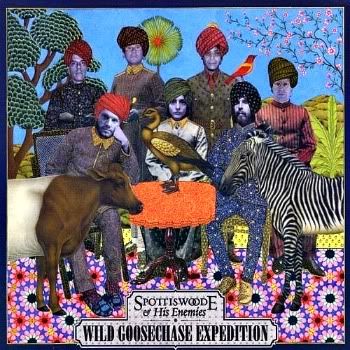
[purchase]
When I wrote about Spottiswoode in my post on Rosler‘s Recording Booth, I said I wanted to know more about his work. It’s great in this business when you get your wish, but it’s even better when your first impression is correct. Wild Goosechase Expedition is a generous helping of Spottiswoode & His Enemies, with seventeen songs and just over an hour of music. The rich musical imagination that was on display in his Rosler performance is here in abundance. This is also my first encounter with Spottiswoode as a writer. He serves up a wonderfully varied but highly coherent program of songs here. His band must be conversant in a variety of musical styles and moods, and they show themselves here to be very fine musicians. I particularly want to single out the work of drummer Konrad Meissner. Spottiswoode’s regular drummer Tim Vaill was not available for the recording sessions, so Meissner was called on to sub for him. Meissner had to be versatile, and pick up on the variety of moods that Spottiswoode wanted in these songs, and he did a great job. Vaill is now back with the band, but they would do well to stay in touch with Meissner in case they ever need him again.
The line-up of Spottiswoode & His Enemies starts off normally enough, with drums, bass, and Spottiswoode on guitar. Then things start to get interesting. A second guitarist also plays mandolin and glockenspiel. The keyboard player plays piano, organ, accordion, and maybe something else that I missed. And there are two horn players, who can contribute R&B riffs or Miles Davis-like harmonies on trumpet and sax. The horn players also contribute background vocals. The album opens with Beautiful Monday. This is a sunny pop-rock tune with a British invasion feel, and some horn work of the sort Burt Bacharach used to favor. This establishes a tone of comfort and normalcy that is soon to be disrupted. Purple River, Yellow Sun opens with chanted vocals over chiming piano notes, and the song has bursts of tumult, with anthemic rock vying for supremacy with the poppier sound of the opener. The sense of comfort fades, and the music becomes unsettled. Odd harmonies begin to move in. Just a Word I Use has verses with a French cabaret feel, and bursts of almost hard rock on the choruses. Elsewhere, there are Bo Diddley beats, chiming guitars, jazzy excursions, even some things that border on world music from an unknown tribe. Spottiswoode ties all of this together with his vocals. He sings in a slightly scratchy baritone, and he is one of the most passionate singers I know of. There are plenty of opportunities for him to cross a line, and make the songs bombastic, but that never happens. That said, this album overall has a theatrical quality, and it’s a show I would gladly see.
The title Wild Goosechase Expedition suggests aimlessness, but this album tells a story. I mentioned the sense of normalcy that opens the album. Beautiful Monday is a celebration of normalcy, with only the vaguest hint that this will soon be disrupted. It opens the first section of the album, entitled Setting Out. The setting out actually occurs in Purple River, Yellow Sun, and the previous normalcy becomes either an illusion or a fading memory. The next section is called The Kingdom of the Dead. Here, Spottiswoode’s narrators try with out success to hold on to memories of love. I’d Even Follow You to Philadelphia shows that Spottiswoode can tell his tale with droll humor. The longest section is titled Massacre in the Desert. Here, the narrators have reached the point of despair. Loved ones try to send lifelines, but their messages fall on deaf ears. The album’s title track comes in this section, and it uses black humor to express a sense that whatever motivated this journey was wasted. The final section, Starvation and Surrender, has the narrators returning home, but something has been irretrievably lost, at least as of the end of the album. You Won’t Forget Your Dream closes the album with the suggestion that recovery may be possible, but it can also suggest that the reason for the departure in the first place is regaining its strength as the narrator rests. So this may be a somewhat happy ending, or just the resumption of a cycle. There is ambiguity here, and that is intentional. Taken as a whole, the album may be about a breakup and reconciliation. Or it may be about a spiritual journey, in which a character learns that fulfillment lay in what he already had. Or, the album may be about a band going on and returning from a tour, an idea that is most clearly suggested by the song Wake Me Up When It’s Over. Personally, I think the album is about all of these, and probably a few other things I haven’t mentioned. These songs reach out to the listener, and invite us to imagine. It’s an invitation I was glad to accept.
Spottiswoode & His Enemies: Purple River, Yellow Sun
Spottiswoode & His Enemies: Wild Goosechase Expedition






0 comments:
Post a Comment